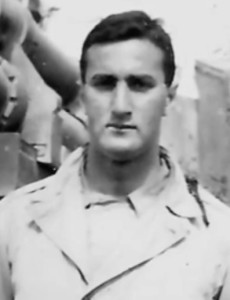
VBOB Member Roger Boas has a new book entitled Battle Rattle: A Last Memoir of World War II. The following is an excerpt from his book. Read more about him and the book at: www.BattleRattleMemoir.com
The shooting began again the following day, and I very nearly lost my life. The objective of this battle was to capture Lorient, a strategic seaport where the Germans had their U-boats in pens. But before committing troops to the battlefield, the U.S. command tried another tactic. Ordered, I believe, by General Patton—I don’t think he would have had the hubris to do it on his own—General Wood sent a radio message to the German commander at Lorient demanding his surrender. When no affirmative response was received, we attacked their emplacements outside of the city.
My artillery battalion went into position not far from Lorient, near a very small town called Caudan (population 2,000). Our job was to support Colonel Creighton Abrams’s blistering 37th Tank Battalion, which was leading the attack. The job of the artillery was to set up our eighteen howitzers in range of the enemy’s guns or enemy troop movement. We’d need a forward observer to spot these positions, of course––and as luck would have it, it was my turn.
Major Parker ordered me and my support team to find the highest available perch for an observation post (OP). I surveyed the area and spotted something in the distance––a church steeple at the center of the nearby town. Perfect.
Or at least I thought it was perfect. You got up there with a pair of field binoculars and could see the entire panorama. The Germans had to survey a huge landscape, so even though it was probably the highest structure, they wouldn’t necessarily know we were there. Sure, there was the risk that, with only one way in and out of a bell tower, a rapid evacuation might not be easy. And there was always the danger that my binoculars or another piece of glass could catch the sun and give us away. But every place has its risks. I was totally preoccupied that morning with wanting to do a good job in my debut as forward observer in an actual battle (putting aside the disheartening realization that I had somehow fallen into one of the most dangerous jobs in the army).
Once we went into action any fears seemed to disappear. Excited to be taking up our first observation post, my team drove furtively to Caudan’s main square in our jeep. After parking quietly in an alley, the three of us—Sergeant Plas with his radio, my corporal with his telephone, and me with my map and binoculars—climbed the dusty, winding steps of the timeworn tower to emerge at the thirty-foot top of the church steeple.
The view was breathtaking. And I could easily make out the Germans’ artillery positions from their gun flashes. Keyed up, I got to work, plotting out coordinates and barking them out to Plas, who radioed the firing orders back to our three batteries of six guns each.
Of course, as soon as we began shooting, my German counterpart (wherever he was hiding) would observe the flashes of our guns and would start telling his gun batteries where to shoot back. Pretty soon the entire valley was filled with the booming thunder of artillery. And that’s how it was all morning. Fire. Counterfire. Fire. Counterfire.
The OPs all had one constant: the focus was on the enemy, and not the slightest attention was paid to the civilians in the area or their habitat. We’d often find that the enemy artillery and mortars were next to farmhouses or village homes or in streets or town structures in which civilian noncombatants might be living or working. Yet during the war, I cannot recall anyone ever giving any thought to protecting enemy civilians; our role was to rout the enemy military. If enemy civilians (collateral damage, in today’s jargon) lost their lives––so be it. We never stopped adhering to our mantra: a good German is a dead German.
By mid-afternoon, my shots were improving. I had a pretty good fix on where to aim, but just as I was feeling confident that we could soon take out some of their batteries, it got dark. Major Parker ordered us to stop firing. After nightfall, firing your artillery makes you an easy target––as the muzzle flashes can be seen easily for miles. Thus, we had a de facto ceasefire till dawn.
My team and I snuck back to the jeep and returned to our unit to bed down for the night. I threw down my bedroll in the corner of a barn and shut my eyes, both exhausted and exhilarated. Even though the artillery bombardment had ceased, there continued to be small arms fire—the occasional rat-a-tat-tat of a machine gun burst or a solitary sniper shell ricocheting off a wall. But my mind, amazingly, was able to tune all of that out––to label it “distant danger,” not imminent––allowing me to slumber in peace. We had been at this for three weeks, and, while certainly not grizzled like the Fourth Infantry, we were now actual combat veterans.
The following morning Sergeant Plas shook me awake with a cup of coffee. It was an hour before dawn––time to get going. I reported to Lieutenant Colonel Graham, who asked me where I planned to set up today’s OP. I told him I intended to return to the bell tower, which, in my view, had been an ideal position from which to observe the action. The thought seemed to intrigue him, and Graham announced suddenly that he was going to join us.
While artillery commanders tend to stay behind the front lines so they can supervise the guns, I could certainly see why Graham might have wanted to get an overview of the battlefield—to see the actual impact of our shelling and the counterfire from the enemy guns. Though he was more than ten years my senior and far higher in rank, it occurred to me that this was Lieutenant Colonel Graham’s first time in front-line combat, just like me. He wanted to observe the battlefield to glean information that could improve both his understanding and skills as an artillery commander.
So off we went—six of us, including the two drivers––moving through the pre-light of dawn to the town square in Caudan. Darting quietly up three stories to the top of the bell tower, I unfurled my map and got to work. Feeling proud to have the colonel at my side, I pointed out the landmarks that I had spotted the day before––the places I had calculated as likely enemy artillery positions. Graham nodded and, after checking them out with his own binoculars, ordered me to begin the bombardment.
The shooting began and, once again, the plain erupted in artillery explosions. Trying to stay calm under the added pressure of having the CO breathing down my neck, I adjusted my firing coordinates and within short order felt pretty certain to have taken out at least one enemy battery. But that’s when, suddenly, the tables turned. They started firing at us! German shells began coming in from an artillery battery I hadn’t spotted earlier, one with a closer vantage point––which meant I could easily see its muzzle flashes.
Since their rounds were missing us, I decided to return fire, quickly calculating coordinates and having Plas radio them back. My first shot missed. They fired back at us. It was harrowing having shells fly in our direction, whizzing by the steeple.
I quickly shouted out an angle correction, which Plas radioed back to our battalion. These firing exchanges were hair-raising. Who would blink first? Then one of their shells grazed the outside of the steeple, causing bits of masonry to fall, crashing thirty feet to the ground.
“Abandon post!” I shouted suddenly, allowing Sergeant Plas and my corporal to descend the narrow stairwell before me. I gestured to Lieutenant Colonel Graham to do likewise, and we hightailed it as fast as we could down the winding steps, spurting to safety in the nick of time. The German artillery struck a direct hit on the upper part of the steeple, which came crashing down into a pile of rubble.
My eyes widened as I tried to catch my breath, adrenaline coursing through my veins. That was close. My mind began deconstructing the sequence of events, wondering how they had spotted us in the first place, since we certainly were not firing any weapons from the tower. Then it occurred to me: the Germans must have picked up a flashing reflection of the sun off my binoculars. It had been a close call, but the fact that it took the enemy over twenty-four hours to figure out where I was observing them from illustrates how difficult it can be to find the correct target.
The next day my division received orders to leave the Brittany peninsula and move east toward Orléans. I was told that Alex Graham had put me in for a Silver Star decoration for the church steeple action. And Alex was himself put up for his own Silver Star by Colonel Bixby. But the division’s adjutant general, Lieutenant Colonel R. M. Connolly, arbitrarily reduced them to Bronze Stars, supposedly saying: “I’ll be goddamned if I’ll recommend a Silver Star for an artilleryman.” On the Silver Star application sent in by Graham, Connolly had simply printed: “Bronze Star Award directed by C.G.”
Nasty comments were made in my battalion about the adjutant’s attitude and the fact that, as a rear echelon staff officer, he had never even seen action. We were offended: “We’re getting shot at and this desk-jockey has the nerve to criticize us.” Certainly, getting out of the steeple unhurt had been a close shave; another minute and I’d have been a goner. Our artillery battalion had taken causalities steadily since going into war and, in our parochial view, being an artilleryman was dangerous. But, looking back, I’ve changed my mind: the divisional adjutant was right. Being a field artilleryman firing the howitzers several hundred yards behind the front lines was much less dangerous than being an infantryman or tanker on the front lines, a fact none of us considered. What Colonel Connolly failed to realize was that an artillery forward observer, like me (and Colonel Graham that particular day), was stationed at the front line, right alongside the infantry—a fact that would soon cost Dude Dent his life.
For further information, visit www.BattleRattleMemoir.com
